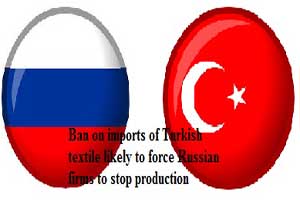
Ban on imports of Turkish textile likely to force Russian firms to stop production
YarnsandFibers News Bureau 2015-12-24 11:00:00 – MoscowFollowing the incident, Russia introduced a range of sanctions targeting Turkey, ranging from restrictions on visa-free travel to a ban on imports of fabrics and textile products. Vadim Solovyov, the Deputy Chairman of the Duma Committee on constitutional legislation and state construction and a member of the Communist Party warned that the current situation might force Russian textile firms to stop production.
Solovyov sent a letter to Prime Minister Dmitry Medyedev and the Minister of Industry and Trade Denis Manturov stating that the fabrics already purchased by Russian textile companies from Turkish fabric manufacturers are still in Turkey, as the carriers refuse to deliver them into Russia or wait in the transit zone between Ukraine and Russia.
He urged to take action against the unofficial ban on the import of fabrics and textile products from Turkey into Russia.
According to the Russian daily Kommersant, Turkish textiles are not officially included in the Russian sanctions list against Turkish goods but were under an unofficial ban.
However, the Deputy head of the Ministry of Industry and Trade of the Russian Federation Victor Evtukhov stated recently that a ban could be formally established for Turkish textile products. The Department already proposed to ban the import of 70-80% of light industry goods from Turkey. This may create problems to international retailers, producing clothing in Turkey for Russia, including brands like Zara, Mango, Lacoste and Adidas.
The foreign trade volume between Turkey and Russia in 2014 compared to previous year showed increased by 17.3 percent reached $31.2 billion.
Market Intelligence
Ask for free sample Report

experience
Customer Base
dedicated team
Countries Served Worldwide









